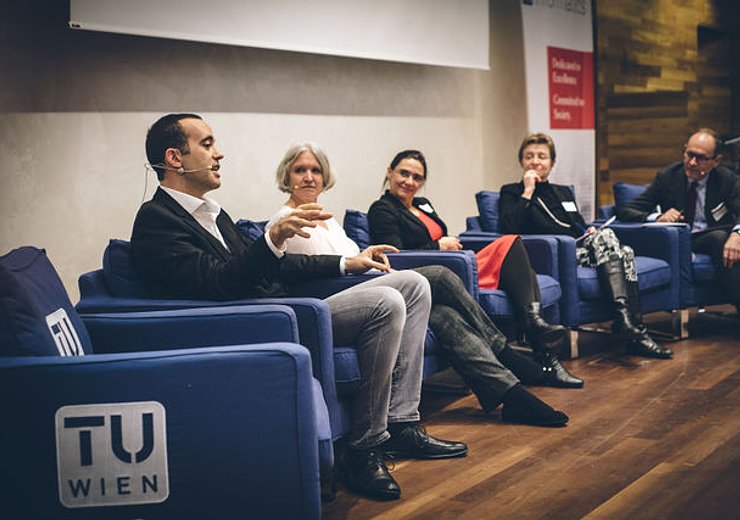Computing Is Too Important to Be Left to Men
We invited international experts to investigate women-promoting measures and successful concepts. Here are their findings and ideas.

“Computing Is Too Important to Be Left to Men”—famous computer scientist Karen Spärck Jones’s (1935-2007) quote was the motto of our workshop and panel discussion at TU the Sky on December 3, 2019: International experts investigated women-promoting measures and presented successful concepts.
Informatics and its artefacts are major drivers of change with enormous personal, societal, economic and political impact. Digitalization, the process to transform a whole society into “the digital” by adopting digital technologies, is mainly driven by computer scientists. However, who are these computer scientists who are going to change the world so drastically? To the large majority, Informatics’ students and scientists are male, but female participation and their contribution are necessary to make information technology and related scientific fields more diverse.
Role Models Wanted
In order to change the situation and to promote gender diversity, measures are necessary to encourage young women to study Informatics and to support them during their (academic) career. The workshop was devoted to the questions of how to support young women in Informatics studies, what support measures are appropriate and how successful these measures are. “I really didn’t know that women where not supposed to do science - until I went to university,” Jane Hillston from the University of Edinburgh explained the importance of female role models. Since her mother worked as a scientist in a lab and all her teachers were female, she only realized during her studies that no female faculty or PhD candidates were around.
Erika Ábrahám from RWTH Aachen agreed: “I was forced to become like a man in my scientific work, and I would have liked to have female faculty.” Also Ute Schmid from the University of Bamberg emphasizes “that many girls from girls’ schools go to STEM subjects, since they have the role models.” And Gerti Kappel from TU Wien Informatics pointed out that the post-doc positions for female scientists turned out to be quite helpful: Three out of eight female post-docs are full professors at our Faculty now.
Invisible Women
During World War II programming was mostly done by women, and in the sixties there were still 30-50 percent female programmers. “After it became prestigious, we lost the women and men took over programming. The women were not visible, and we just lost them,” Erika Ábrahám said. Only three women out of 67 persons received the Turing Award between 1966 and 2017, and she strongly promoted the idea of actively offering PhD positions to young women, since they were not so self-assured concerning their academic careers. “Getting the girls into Computer Science is one thing, but keeping them and support them building up a career is another,“ Ute Schmid is convinced. From her experience, one has to make women’s promotion a mission for the whole faculty and involve teachers as well. Speaking of invisibility, Jane Hillston remembered the Suffrage Science Award was given to the winners in a back room of the British Library when it was closed: “I never felt more like a suffragette in my life.”
Inspiring Discussion
After having exchanged best practices in the workshops, the closing panel discussion was moderated by media expert Gerald Groß. Jane Hillston, Erika Ábrahám and Gerti Kappel were joined by Loukas Balafoutas from the University of Innsbruck, and the panelists highlighted questions like “Should there be a quota for female professors to get more women in top positions? How come that women were actively involved in programming at the beginning and then were pushed out by men? How to deal with the gender pay gap? How can we change the system and not put the responsibility on the women (and other minorities) to fit in the system?“ A long way to go, but we should keep on going!
Downloads
-
PDF / 2.16 MB / 2019-12-03-program.pdf
-
Erika Ábrahám / Women in Computer Science. Do We Still Need Equality Measures?PDF / 12.2 MB / Abraham_WomenInComputerScience.pdf
-
Jane Hillston / Role Models and Champions – What We Need to Get More Diversity in Computer SciencePDF / 12.2 MB / Hillston_RoleModelsAndChampions.pdf
-
Gerti Kappel / Several Female Support Activities Later – What Have We Learned?PDF / 1.09 MB / Kappel_FemaleSupport_20191203.pdf
-
Ute Schmid / Empirically Guided Gender Equality Measures for Recruiting and Retaining Female Computer Science StudentsPDF / 6.45 MB / Schmid_Empirically_guided_gender_equality_measures.pdf
-
PDF / 244 KB / Workshop_BestPractices.pdf
-
PDF / 282 KB / Workshop_Evaluation.pdf
Curious about our other news? Subscribe to our news feed, calendar, or newsletter, or follow us on social media.










